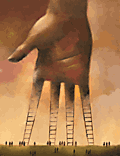
About F&D Subscribe Back Issues Write Us Copyright Information |
How We Can Help the Poor
Of the world's 6 billion people, 2.8 billion—almost half—live on less than $2 a day, and 1.2 billion—a fifth—live on less than $1 a day. In the poorest countries, as many as one in every five children does not reach his or her fifth birthday and as many as half of the children under 5 are malnourished. Although human conditions improved more in the twentieth century than in all of the rest of history, the distribution of global gains has been extraordinarily unequal. The average income in the richest 20 countries is 37 times the average in the poorest 20—a gap that has doubled in the past 40 years. Seventy percent of all people living on less than $1 a day are in South Asia and sub-Saharan Africa. And conditions in some parts of the world—notably the countries of the former Soviet Union—have been getting worse: the number of people living in poverty in Central Asia and some European countries rose by more than 20 times between 1987 and 1998. As shocking as these figures are, poverty is not just a question of income. The poor suffer on many fronts and may be powerless to improve their situation because of ill health, isolation, poor education, and lack of access to the many opportunities available to those better off. They are extremely vulnerable to natural disasters and economic upheavals as well as to crime and violence. And they are often deprived of the basic rights the rest of the world takes for granted. What can the industrial countries, international financial institutions, and developing countries' governments do to help the poor? The articles that follow describe the weapons available to us in the fight against poverty. |